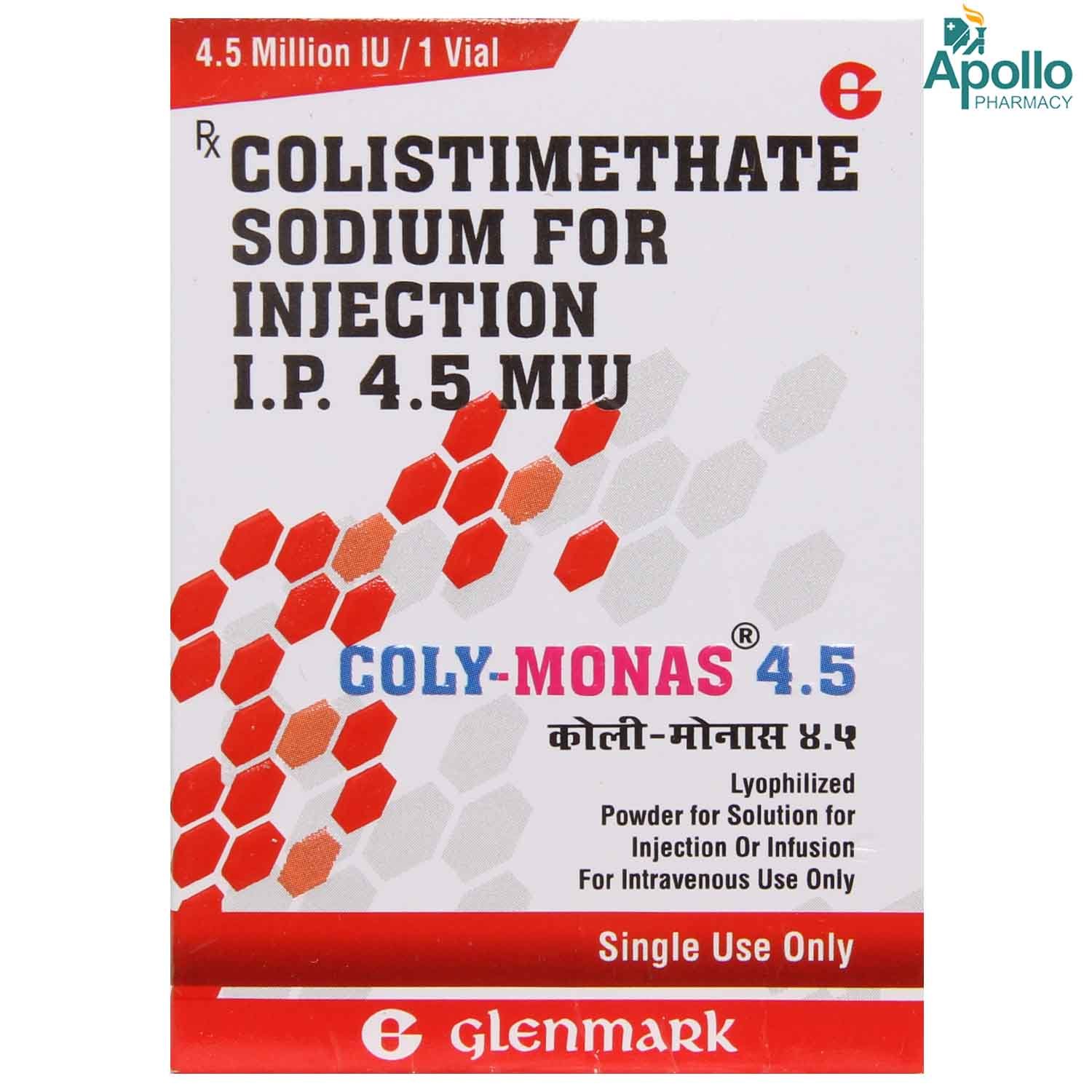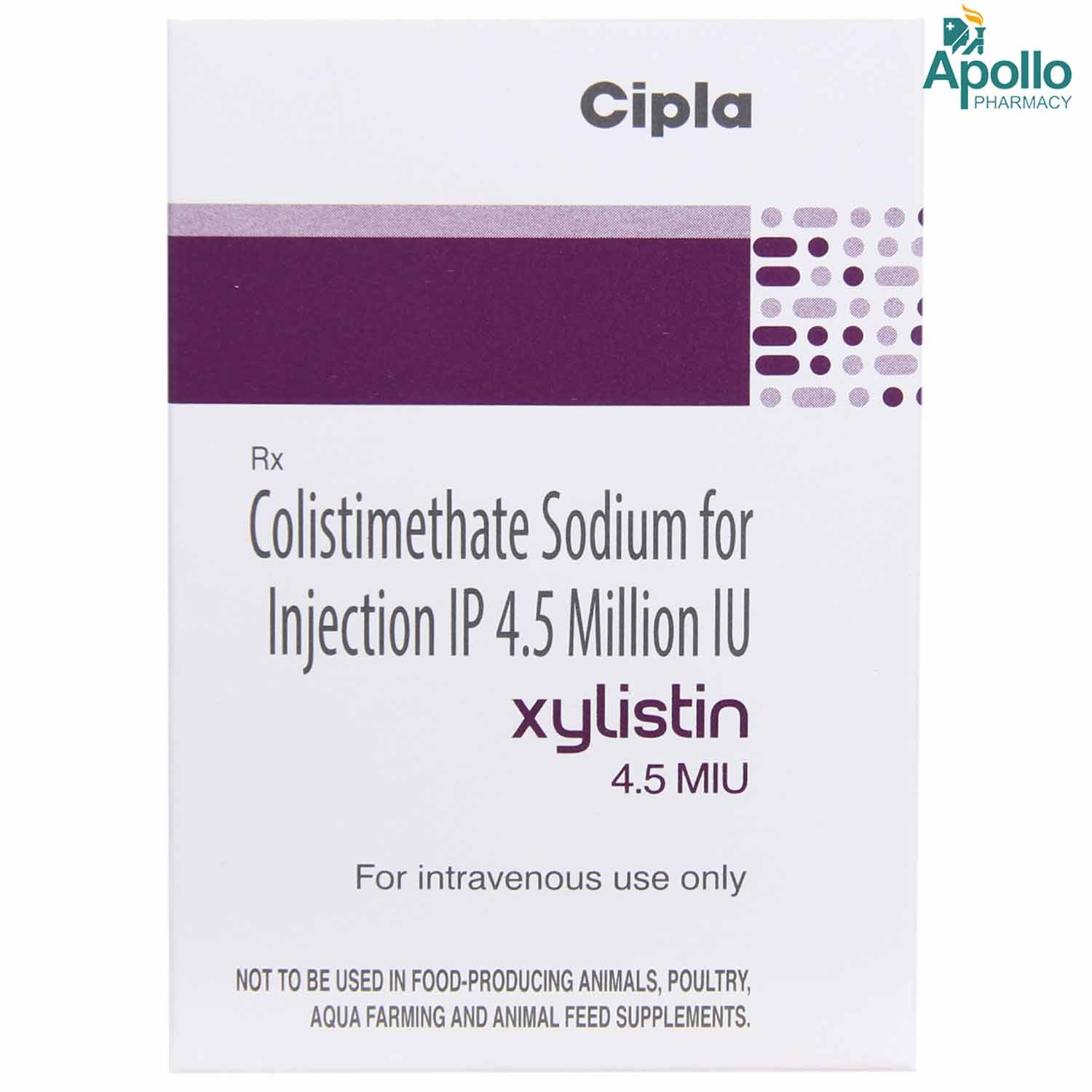Colistimethate
About Colistimethate
Colistimethate belongs to a class of drugs called antibiotics used in the treatment of severe bacterial infections. Bacterial infection is a condition in which harmful bacteria grow in the body and cause infection. It can infect any part of the body and multiply very quickly. Colistimethate does not work against infections caused by a virus.
Colistimethate contains Colistimethate, an antibiotic that works by binding to bacterial cell membranes that are essential for their survival as they prevent the entry of unwanted substances into the cells and stop the leakage of cell contents. Thereby, damaging bacterial cell membranes and kills bacteria.
Take Colistimethate as prescribed by your doctor. You are advised to take Colistimethate for as long as your doctor has prescribed it for you based on your medical condition. In some cases, you may experience dizziness, stomach upset, tingling, or difficulty in breathing. Most of these side effects of Colistimethate do not require medical attention and gradually resolve over time. However, if the side effects persist or worsen, please consult your doctor.
If you are allergic to Colistimethate or any other medicines, please tell your doctor. If you have myasthenia gravis (muscle weakness), kidney problems, or porphyria (a disorder in the formation of red blood pigment), inform your doctor before taking Colistimethate. If you are pregnant or breastfeeding, please inform your doctor before taking Colistimethate. Special care should be taken in new-born and premature babies as kidneys are not developed fully. Drive only if you are alert as Colistimethate may cause confusion, vision problems, or dizziness. If you are on dialysis, inform your doctor before taking Colistimethate so that the dose may be reduced accordingly.
Uses of Colistimethate
Medicinal Benefits
Colistimethate contains Colistimethate, a narrow-spectrum antibiotic that is active against gram-negative bacteria. Colistimethate binds to bacterial cell membranes that are essential for their survival as they prevent the entry of unwanted substances into the cells and stop the leakage of cell contents. Thereby, damages bacterial cell membranes and kills bacteria. Colistimethate is used when other antibiotics are not suitable.
Directions for Use
- Your doctor will determine the dosage and timing of Colistimethate based on the severity of your infection. Typically, it is administered every 6-12 hours.
- Colistimethate is administered by a healthcare professional as an infusion over 30 to 60 minutes or as a rapid injection within 5 minutes into a vein
- Do not self-administer it.
Storage
Side Effects of Colistimethate
- Dizziness
- Stomach upset
- Tingling
- Difficulty in breathing
Drug Warnings
If you are allergic to Colistimethate or any other medicines, please tell your doctor. If you have myasthenia gravis (muscle weakness), kidney problems, or porphyria (a disorder in the formation of red blood pigment), inform your doctor before taking Colistimethate. If you are pregnant or breastfeeding, please inform your doctor before taking Colistimethate. Special care should be taken in new-born and premature babies as kidneys are not developed fully. Drive only if you are alert as Colistimethate may cause confusion, vision problems, or dizziness. If you are on dialysis, inform your doctor before taking Colistimethate so that the dose may be reduced accordingly. Inform your anesthetist that you are taking Colistimethate as it may increase the effects of muscle relaxants used in general anesthesia. You are recommended to complete the full course of Colistimethate as prescribed by your doctor for effective results.
Drug Interactions
Drug-Drug Interaction: Colistimethate may interact with antibiotics (amikacin, netilmicin, tobramycin, gentamicin, erythromycin, clarithromycin, azithromycin, ciprofloxacin, norfloxacin, ofloxacin).
Drug-Food Interaction: No interactions found.
Drug-Disease Interaction: If you have myasthenia gravis (muscle weakness), kidney problems or porphyria (a disorder in the formation of red blood pigment), inform your doctor before taking Colistimethate.
Drug-Drug Interactions Checker List:
Safety Advice

Alcohol
cautionInteraction of Colistimethate with alcohol is unknown. Please consult a doctor before consuming alcohol while using Colistimethate.

Pregnancy
cautionColistimethate is a category C pregnancy drug and is given to pregnant women only if it is essential. Please consult a doctor if you are pregnant or planning for pregnancy.

Breast Feeding
cautionColistimethate may be excreted in human milk in small amounts. Therefore, it is given to breastfeeding mothers only if the doctor thinks benefits are greater than risks. Please consult a doctor if you are breastfeeding.

Driving
cautionColistimethate may cause confusion, vision problems or dizziness. Therefore, avoid driving if you experience any of these symptoms after taking Colistimethate.

Liver
cautionTake Colistimethate with caution, especially if you have a history of Liver diseases/conditions. The dose may be adjusted by your doctor as required.

Kidney
cautionTake Colistimethate with caution, especially if you have a history of Kidney diseases/conditions as Colistimethate may affect kidney function. The dose may be adjusted by your doctor as required.

Children
cautionColistimethate should be used with caution in children and in doses as prescribed by a doctor. Special care should be taken in new-born and premature babies as kidneys are not developed fully.
Habit Forming
Diet & Lifestyle Advise
- Take probiotics after completing the full course of Colistimethate to restore some healthy bacteria in the intestines that may have been killed. Taking probiotics after antibiotic treatment can reduce the risk of antibiotic-associated diarrhea. Certain fermented foods like cheese, yogurt, kombucha, sauerkraut, and kimchi can restore the good bacteria of the intestine.
- Include fiber-rich foods, as they can be easily digested by your gut bacteria, which helps stimulate their growth. Thus, fiber-rich foods may help restore healthy gut bacteria after a course of antibiotics. Whole grains such as whole-grain bread and brown rice should be included in your diet.
- Make sure you drink plenty of water or other fluids every day while you are taking Colistimethate.
- Avoid alcohol consumption as it may increase adverse effects.
Special Advise
- Regular blood tests are recommended to monitor the levels of Colistimethate in blood and kidney functioning.
- Inform your anaesthetist that you are taking Colistimethate as it may increase the effects of muscle relaxants used in general anaesthesia.
Patients Concern
Disease/Condition Glossary
Bacterial infection: It is a condition in which harmful bacteria grows in the body and cause infection. It can target any part of the body and multiple very quickly. Bacteria come in three basic shapes, namely spherical, rod or spiral-shaped. Bacteria may be gram-positive (have thick cell wall) or gram-negative (do not have cell wall). Appropriate tests are done to identify bacterial strains, and based on the results, proper medication is prescribed. Some common symptoms of bacterial infection include cough, fever and tiredness.
FAQs
Colistimethate is used to treat bacterial infections.
Colistimethate contains Colistimethate, an antibiotic that works by binding to bacterial cell membranes that are essential for their survival as they prevent the entry of unwanted substances into the cells and stops the leakage of cell contents. Thereby, damages bacterial cell membranes and kills bacteria.
You are not recommended to take Colistimethate with gentamicin as co-administration of these two medicines may increase the risk of severe adverse effects such as kidney problems, hearing loss or respiratory depression especially in elderly people and in those who have preexisting kidney disease or who are dehydrated. However, please consult your doctor before taking Colistimethate with other medicines.
Colistimethate may cause dizziness as a common side effect. Avoid driving if you feel dizzy after taking Colistimethate. However, if the condition persists or worsens, please consult a doctor.
Colistimethate should be used with caution in patients receiving dialysis (the process of filtration and purification of blood using a machine). Therefore, if you are receiving dialysis, please inform your doctor before taking Colistimethate so that the dose may be adjusted accordingly.
You are recommended to take Colistimethate with extreme caution if you have kidney disease as it may worsen the condition. Regular monitoring of kidney functioning is recommended while taking Colistimethate. Therefore, inform your doctor if you have any kidney problems before taking Colistimethate.
Before taking Colistimethate, inform your doctor if you have a history of kidney problems, myasthenia gravis (a condition that causes muscle weakness), porphyria (a blood disorder), or asthma. These conditions may affect your treatment or require special monitoring.
Colistimethate is given by a healthcare professional as an infusion over 30–60 minutes or as a rapid injection within 5 minutes into a vein. Do not self-administer.
Do not use Colistimethate if you are allergic to its active substances or any other polymyxins (group of antibiotics to treat bacterial infection). If you are unsure, consult your doctor before receiving Colistimethate.
Colistimethate is prescribed during pregnancy only if your doctor thinks that the benefits are greater than the potential risks. The safety of Colistimethate during pregnancy has not been fully established. Therefore, consult your doctor before taking Colistimethate if you are pregnant.
Colistimethate is safe when used as per the dose and duration advised by a doctor.
Colistimethate causes side effects such as dizziness, stomach upset, tingling, and difficulty in breathing. However, these do not require any medical treatment and gradually reduce over time. Contact a doctor if these side effects persist for longer durations.




